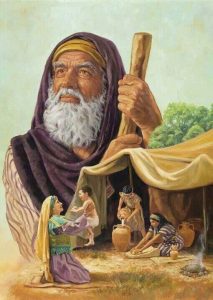HOMILY LENT WEEK 05 04 – Year II
Keeping the Covenant and Living the Word:
(Gen 17:3-9; Ps 105; Jn 8:51-59)
******************************************
In Indigenous cultures, there is always someone in each community or territory who is the keeper of the traditions and ceremonies.
Today, the Word of God invites us to be keepers of the Covenant and live out that Word by doing the will of God.
In the first reading, God establishes a covenant relationship with Abram, one so significant it involves changing his name to Abraham. To think of it, this is an amazing example of God’s particular love, that the creator of the universe would humbly appear to an aged insignificant Jew in the wilderness of the Middle East. This event brings to mind the appearance of the angel Gabriel to Mary – a kind of first annunciation. It also brings to mind Jesus calling both Lazarus and Mary Magdalene by name, bringing new life to both. As well, it brings into play the whole dynamic and ethos of a wedding ceremony, when a couple exchange vows and are transformed for life into a new reality in the world with all the possibilities that holds for intimate relationship, children and family.
 Today’s reading is a third version of Abraham’s call, each time adding a few new elements to the meaning of their relationship or covenant. But one thing that does not change is that, although the relationship is totally initiated and invited from God’s side, it is still a bilateral covenant. There is always a bit more of a requirement expected from Abraham each time: leaving his country and family (12:2), the sacrifice of an animal (15:9-11), circumcision (17:9-14), and belief that he will have a son (17:16ff), which causes his wife Sarah to laugh, for he was 99 and she around 80!
Today’s reading is a third version of Abraham’s call, each time adding a few new elements to the meaning of their relationship or covenant. But one thing that does not change is that, although the relationship is totally initiated and invited from God’s side, it is still a bilateral covenant. There is always a bit more of a requirement expected from Abraham each time: leaving his country and family (12:2), the sacrifice of an animal (15:9-11), circumcision (17:9-14), and belief that he will have a son (17:16ff), which causes his wife Sarah to laugh, for he was 99 and she around 80!
The God-human relationship must start bilaterally, to get humanity involved in a give and receive relationship, but it is not the final goal. Gradually, as the Hebrew people are continually unfaithful to the initial Abrahamic covenant, it becomes more and more unilateral from God’s side. In a wonderful way, God ends up doing it all, whether we cooperate or not. That is the dynamic through the successive covenants with Noah, David and what Jeremiah predicts, a “new covenant” that we know is realized in Jesus.
The final covenant God made with humanity is a perfect covenant, through the sacrifice of Jesus’ body and blood on the Cross. Jesus becomes the living icon of that new and everlasting covenant, where God does all the loving and we do all the receiving.
This is the background and foundation with which to read the Gospel today. Jesus himself stands in right relationship with his Father, and receives all his “glory,” from one Source – the Father. Jesus is the Word of God made flesh, and here, proclaims he is God through the great “I Am” (“Ego Eimi” in Greek) of the bible, the exact same words God used to identify God’s self to Moses.
And Jesus tells us that we can have it too – we are invited to receive and reflect that same glory that is reflected from Jesus. This is exactly the “eternal life” that Jesus speaks of. This is way beyond psychological or moral worthiness – it is about metaphysical identity, our True Self that is our “birthright” from God. It is like the newness that wedding vows bring to a newly married couple.
Jesus stresses keeping his covenant begins with total faith and trust in him as the Messiah sent by the Father, living his Word and doing his will in our lives, which above all means to love God, others, ourselves and even our enemies, as he did. It means to live the values of the Beatitudes, a summation of his teachings.
How unfortunate that the religious leaders of Jesus’ time were so caught up in a religious system of their own making that they missed it. They should have been the first to recognize and accept this new covenant yet were the very ones who resisted the most, to the point of hating Jesus and wanting to kill him. Like their ancestors, they were unfaithful to the covenant, preferring the false gods of possession, prestige and power to truly doing the will of God. They were so attached to these false gods they even turned their religion into a self-serving travesty of real religion. One could even say they had a religious addiction.
The Eucharist makes present that new covenant in Jesus’ Body and Blood, through word and sacrament. May our celebration deepen our faith in Jesus, help us to keep his Word, do His will and live out the new covenant relationship of intimate love the Father has established with us through him.



